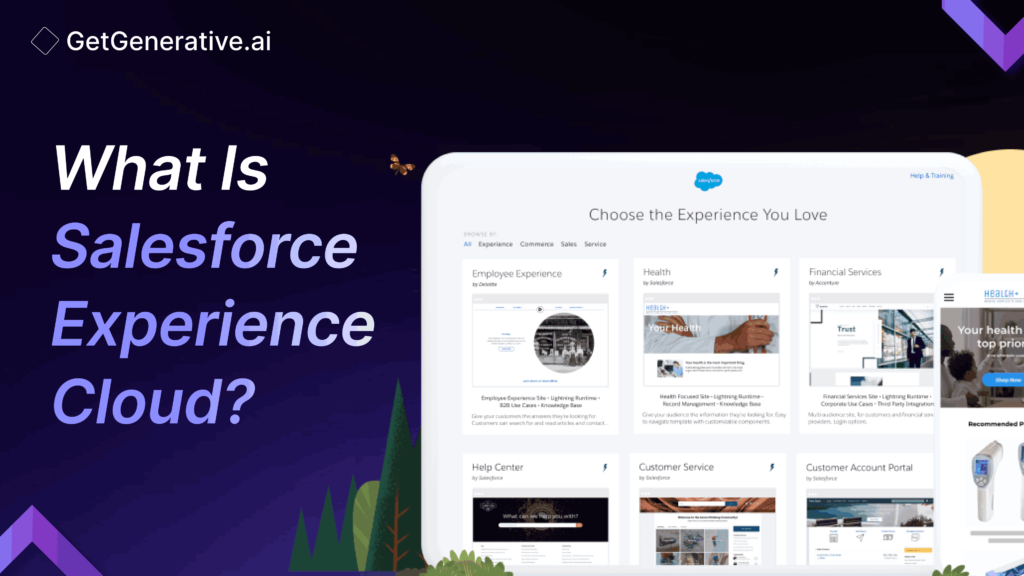What Is Salesforce Experience Cloud?
According to a report, 89% of companies compete primarily based on customer experience. This statistic underscores the importance of tools like Salesforce Experience Cloud in today’s competitive landscape.
As businesses increasingly focus on building meaningful relationships with their customers, Salesforce Experience Cloud stands out as a vital asset in driving engagement, fostering loyalty, and boosting revenue.
What is Salesforce Experience Cloud?
Salesforce Experience Cloud is a platform that enables businesses to create branded digital experiences for their customers, partners, and employees. Formerly known as Community Cloud, Experience Cloud offers a range of tools that allow companies to build websites, portals, forums, and mobile apps tailored to their audience’s specific needs. These experiences can be fully customized to reflect a company’s brand and seamlessly integrate with existing Salesforce applications, making managing customer relationships and streamlining business processes easier.
It is built on the robust Salesforce platform, ensuring all customer data, workflows, and processes are unified and accessible from one central location. This integration capability means that users can leverage the full power of Salesforce CRM, analytics, and other products to deliver personalized, engaging experiences at scale.
Key Features
Salesforce Experience Cloud has features that empower businesses to create rich, interactive digital experiences. Some of the key features include:
- Drag-and-Drop Builder: The intuitive, user-friendly builder allows users to create customized experiences without extensive coding knowledge. With drag-and-drop functionality, users can quickly design pages, add content, and incorporate branding elements that align with their company’s identity.
- Personalization: Experience Cloud offers advanced personalization features that allow businesses to tailor content and experiences based on user behavior, preferences, and demographics. This ensures that each user interacts with relevant content, enhancing engagement and satisfaction.
- Mobile Optimization: Experience Cloud is designed with mobile users in mind, ensuring that all digital experiences are fully optimized for smartphones and tablets. This mobile-first approach means businesses can reach customers wherever they are, providing a seamless and consistent experience across all devices.
- Integration with Salesforce CRM: One of Experience Cloud’s standout features is its deep integration with Salesforce CRM. This integration allows businesses to leverage customer data, workflows, and analytics to create more personalized and effective digital experiences.
- Content Management: Experience Cloud includes a robust content management system (CMS) that enables users to create, manage, and publish content across all digital channels. The CMS fully integrates with Salesforce, allowing easy content management and ensuring consistency across all customer touchpoints.
- Security and Compliance: Salesforce Experience Cloud is built with security at its core, offering robust data protection and compliance features. This ensures that all customer data is secure and that businesses can easily meet regulatory requirements.
How Can I Use Experience Cloud to Enhance Customer Engagement?
Enhancing customer engagement is at the heart of what Salesforce Experience Cloud offers. Here’s how you can leverage its features to build stronger connections with your audience:
- Create Personalized Experiences: Use Experience Cloud’s personalization features to deliver content and experiences that resonate with your customers. You can ensure each customer feels valued and understood by tailoring content based on user behavior, preferences, and demographics.
- Build Interactive Communities: Experience Cloud allows you to create branded communities where customers can interact with each other and with your company. These communities can serve as forums for discussion, customer support, and feedback, fostering a sense of belonging and loyalty among your customers.
- Streamline Customer Support: Use Experience Cloud to create self-service portals where customers can find answers, submit support requests, and track their cases. This enhances the customer experience and reduces the burden on your support team.
- Leverage Data for Insights: Experience Cloud’s integration with Salesforce CRM allows you to use customer data to gain insights into their behavior and preferences. This data can inform your marketing strategies, create targeted campaigns, and continuously improve the customer experience.
- Extend Your Reach with Mobile: More people are accessing the internet through mobile devices than ever before, so ensuring your digital experiences are mobile-optimized is crucial. Experience Cloud’s mobile-first approach means you can engage customers on the go, providing a seamless experience across all devices.
Also Read – Salesforce Experience Cloud Consultant: A Complete Guide
How Does Experience Cloud Integrate with Other Salesforce Products?
Salesforce Experience Cloud seamlessly integrates with other products, making it a powerful tool in a company’s digital ecosystem. Here’s how it works with various Salesforce offerings:
- Salesforce CRM: Experience Cloud’s integration with Salesforce CRM is perhaps its most significant advantage. This integration allows businesses to pull customer data directly from Salesforce, ensuring that real-time data informs all digital experiences. This leads to more personalized and effective customer interactions.
- Salesforce Service Cloud: Experience Cloud can be integrated with Service Cloud to create self-service portals, knowledge bases, and communities. This integration helps provide quick and efficient customer support, reducing the need for direct contact with support agents.
- Salesforce Marketing Cloud: By integrating with Marketing Cloud, Experience Cloud allows businesses to create targeted marketing campaigns based on user behavior and preferences. Marketing Cloud’s robust analytics can be used to measure the effectiveness of these campaigns and refine strategies over time.
- Salesforce Commerce Cloud: Experience Cloud can also integrate with Commerce Cloud to create personalized e-commerce experiences. This integration allows businesses to provide a consistent and seamless shopping experience across all digital channels, from product discovery to purchase.
- Salesforce Analytics: Experience Cloud’s integration with Salesforce Analytics enables businesses to track the performance of their digital experiences and make data-driven decisions. With access to detailed analytics, companies can continuously optimize their digital strategies to improve customer engagement.
What Are the Main Differences Between Experience Cloud and Community Cloud?
Salesforce Experience Cloud was previously known as Community Cloud. While the core functionality remains the same, Experience Cloud offers several enhancements and new features that set it apart from its predecessor:
- Broader Scope: While Community Cloud was primarily focused on building online communities, Experience Cloud expands its capabilities to include the creation of a wide range of digital experiences, such as websites, portals, and mobile apps.
- Improved Personalization: Experience Cloud offers more advanced personalization features than Community Cloud. These features allow businesses to deliver tailored content and experiences based on user behavior, preferences, and demographics.
- Enhanced Mobile Optimization: Experience Cloud strongly emphasizes mobile optimization, ensuring that all digital experiences are fully optimized for smartphones and tablets. This is a step up from the mobile capabilities offered by Community Cloud.
- Integration with Additional Salesforce Products: Experience Cloud offers deeper integration with a wider range of Salesforce products, allowing businesses to leverage the full power of the Salesforce ecosystem to create comprehensive digital experiences.
Also Read – Salesforce Products Explained: The Ultimate Guide
Can Experience Cloud Be Customized for Mobile Apps?
Yes, Salesforce Experience Cloud can be fully customized for mobile apps. With the platform’s mobile-first approach, businesses can create digital experiences optimized for mobile devices from the ground up. This includes customizing the user interface, content, and functionality to ensure that the experience is seamless and intuitive on smartphones and tablets.
Experience Cloud’s drag-and-drop builder makes creating mobile-responsive designs easy without extensive coding knowledge. The platform’s robust API capabilities also allow for deeper customization and integration with other mobile applications, ensuring a consistent and cohesive user experience across all digital channels.
Conclusion
Salesforce Experience Cloud is a versatile and powerful platform that enables businesses to create personalized, engaging digital experiences for their customers, partners, and employees. By leveraging its robust features and seamless integration with other Salesforce products, companies can enhance customer engagement, streamline support processes, and drive growth.
Enhance your Salesforce consulting with GetGenerative.ai. Effortlessly craft outstanding proposals, enabling you to dedicate more time to providing exceptional client service.
Start today!
FAQs
1. What is Salesforce Experience Cloud?
Salesforce Experience Cloud is a platform that enables businesses to create customized digital experiences, such as websites, portals, and mobile apps, for their customers, partners, and employees.
2. How does Experience Cloud integrate with Salesforce CRM?
Experience Cloud seamlessly integrates with Salesforce CRM, allowing businesses to use customer data to create personalized and effective digital experiences.
3. Can I use Experience Cloud to create mobile apps?
Yes, Experience Cloud offers robust customization options for creating mobile-optimized experiences that are fully responsive and tailored to mobile users.
4. What are the main differences between Experience Cloud and Community Cloud?
Experience Cloud expands on Community Cloud’s capabilities by offering more advanced personalization, broader digital experience creation options, and enhanced mobile optimization.
5. Is Salesforce Experience Cloud secure?
Yes, Experience Cloud is built with security at its core, offering robust data protection and compliance features.




